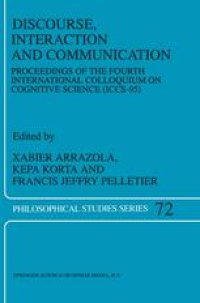
Ebook: Discourse, Interaction and Communication: Proceedings of the Fourth International Colloquium on Cognitive Science (ICCS-95)
- Tags: Interdisciplinary Studies, Philosophy, Linguistics (general), Artificial Intelligence (incl. Robotics), Logic
- Series: Philosophical Studies Series 72
- Year: 1998
- Publisher: Springer Netherlands
- Edition: 1
- Language: English
- pdf
DISCOURSE, INTERACTION, AND COMMUNICATION Co-organized by the Department of Logic and Philosophy of Science and the Institute for Logic, Cognition, Language, and Infonnation (ILCLI) both from the University of the Basque Country, tlle Fourth International Colloquium on Cognitive Science (ICCS-95) gathered at Donostia - San Sebastian ti'om May 3 to 6, 1995, with the following as its main topics: 1. Social Action and Cooperation. 2. Cognitive Approaches in Discourse Processing: Grammatical and Semantical Aspects. 3. Models of Infonnation in Communication Systems. 4. Cognitive Simulation: Scope and Limits. More tllan one hundred researchers from all over the world exchanged their most recent contributions to Cognitive Science in an exceptionally fruitful annosphere. In this volume we include a small though representative sample of tlle main papers. They all were invited papers except the one by Peter Juel Henrichsen, a contributed paper tllat merited tlle IBERDROLA - Gipuzkoako Foru Aldundia: Best Paper Award, set up in ICCS-95 for the first time.
The papers in this volume represent leading-edge work by well-known scholars on the topics mentioned in the title: discourse, interaction, and communication. They report work done from widely divergent points on the theoretical spectrum of cognitive science, and from different disciplinary starting points (philosophy, logic, linguistics, artificial intelligence). Not only do these works faithfully represent the main topics and the wide range of differing positions presented at the Fourth International Colloquium on Cognitive Science (ICCS-95), but despite their differences (or perhaps because of these differences) they also display many clear directions for future research in these three central areas of cognitive science. This book is essential reading for all researchers in cognitive science.
The papers in this volume represent leading-edge work by well-known scholars on the topics mentioned in the title: discourse, interaction, and communication. They report work done from widely divergent points on the theoretical spectrum of cognitive science, and from different disciplinary starting points (philosophy, logic, linguistics, artificial intelligence). Not only do these works faithfully represent the main topics and the wide range of differing positions presented at the Fourth International Colloquium on Cognitive Science (ICCS-95), but despite their differences (or perhaps because of these differences) they also display many clear directions for future research in these three central areas of cognitive science. This book is essential reading for all researchers in cognitive science.
Content:
Front Matter....Pages i-xv
Does the Sentence Exist? Do We Need It?....Pages 1-24
Contextual Domains....Pages 25-36
Thinking of ‘Not’....Pages 37-47
The Metaphorical Conception of Events and Causes: Some Implications of Cognitive Science for Philosophy....Pages 49-83
Formal Semantics, Geometry, and Mind....Pages 85-103
Informational Semantics and Epistemic Arrogance....Pages 105-120
Collective Goals and Cooperation....Pages 121-139
A Logical Approach to Reasoning about Uncertainty: A Tutorial....Pages 141-155
How Commitment Leads to Coordination: The Effect of Individual Reasoning Strategies on Multi-Agent Interaction....Pages 157-163
Building a Collaborative Interface Agent....Pages 165-177
Back Matter....Pages 179-191
The papers in this volume represent leading-edge work by well-known scholars on the topics mentioned in the title: discourse, interaction, and communication. They report work done from widely divergent points on the theoretical spectrum of cognitive science, and from different disciplinary starting points (philosophy, logic, linguistics, artificial intelligence). Not only do these works faithfully represent the main topics and the wide range of differing positions presented at the Fourth International Colloquium on Cognitive Science (ICCS-95), but despite their differences (or perhaps because of these differences) they also display many clear directions for future research in these three central areas of cognitive science. This book is essential reading for all researchers in cognitive science.
Content:
Front Matter....Pages i-xv
Does the Sentence Exist? Do We Need It?....Pages 1-24
Contextual Domains....Pages 25-36
Thinking of ‘Not’....Pages 37-47
The Metaphorical Conception of Events and Causes: Some Implications of Cognitive Science for Philosophy....Pages 49-83
Formal Semantics, Geometry, and Mind....Pages 85-103
Informational Semantics and Epistemic Arrogance....Pages 105-120
Collective Goals and Cooperation....Pages 121-139
A Logical Approach to Reasoning about Uncertainty: A Tutorial....Pages 141-155
How Commitment Leads to Coordination: The Effect of Individual Reasoning Strategies on Multi-Agent Interaction....Pages 157-163
Building a Collaborative Interface Agent....Pages 165-177
Back Matter....Pages 179-191
....